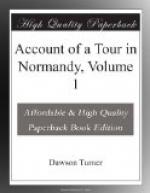The principal towns of France, as was anciently the case in England, have each its mint. The numismatic antiquities of this kingdom are yet involved in considerable obscurity; but it is said that the monetary privileges of the towns were first settled by Charles the Bald[116], who, about the year 835, enacted, that money, which had previously only been coined in the royal palace itself, or in places where the sovereign was present, should be struck in future at Paris, Rouen, Rheims, Sens, Chalons sur Saone, Mesle in Poitou, and Narbonne. At present, the money struck at Rouen is impressed with the letter B, indicating that the mint is second only to that of Paris; for the city has remained in possession of the right of coinage throughout all its various changes of masters: it now holds it in common with ten other, cities in the kingdom. Ducarel[117] has figured two very scarce silver pennies, coined here by William the Conqueror, before the invasion of England; and Snelling and Ruding[118] detail ordinances for the regulation of the mintage of Rouen, during the reign of Henry Vth. I have not been able, however, to procure in the city any specimens of these, or of other Norman coins; and in fact the native spot of articles of virtu is seldom the place where they can be procured either genuine or in abundance. Greek medals, I am told, are regularly exported from Birmingham to Athens, for the supply of our travelled gentlemen; and, if groats and pennies should ever rise in the market, I doubt not but that they will find their way in plenty into the old towns of Normandy. There is not, at Rouen, any public collection of the productions of the mint. Since the annexation of the duchy to the crown of France, no coins have been struck here, except the common silver currency of the kingdom: the manufacture of medals and of gold coins is exclusively the privilege of the Parisian mint. The establishment is under the care of a commissary and assay-master, appointed by the crown, but not salaried. Their pay depends upon the amount of money coined, on which they are allowed one and a half per cent., and are left to find silver where they can; so that, in effect, it is little more than a private concern. The work is performed by four die-presses, moved by levers, each of which requires ten men; and about twenty thousand pieces can be produced daily from each press. But this method of working is attended with unequal pressure, and causes both trouble and uncertainty: it is even necessary that each coin should be separately weighed. The extreme superiority of the machinery of our own mint, where the whole operation is performed by steam, with a rapidity and accuracy altogether astonishing, affords Just reason for exultation to an Englishman.—It is true, that the execution of our bank paper rather counterbalances such feelings of complacency.
Footnotes:




